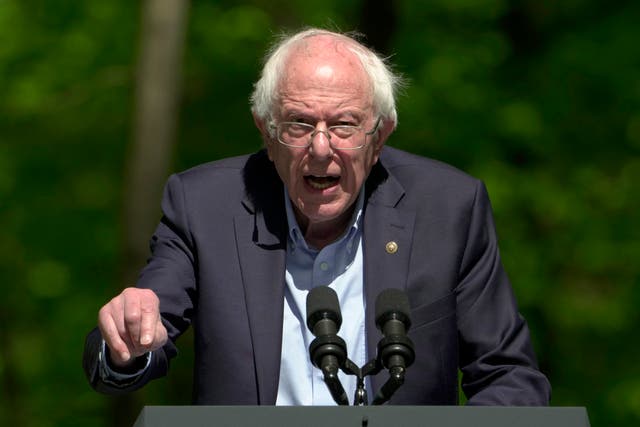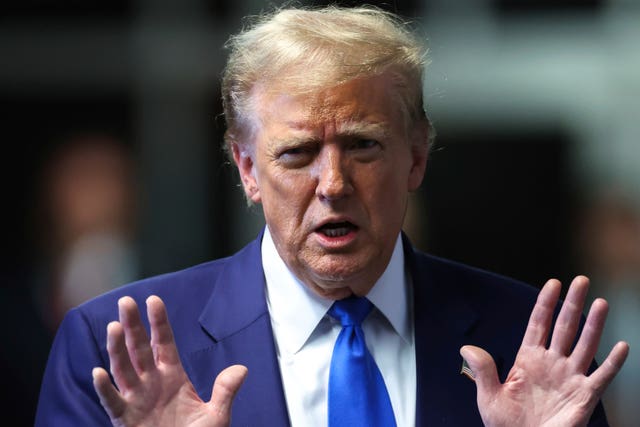Bernie Sanders remains fully committed to supporting President Joe Biden’s bid for a second term despite differences over his handling of the Gaza conflict.
In April, Mr Sanders repeatedly stood shoulder to shoulder with Mr Biden, promoting their joint accomplishments on health care and climate at formal White House events while eviscerating Donald Trump in a widely viewed campaign TikTok video.
Then just last week, Mr Sanders was bluntly warning that the crisis in Gaza could be Mr Biden’s “Vietnam” and invoking President Lyndon B. Johnson’s decision not to run for re-election as the nation was in an uproar over his support of that war.
The two octogenarians who share a bond that was forged through a hard-fought primary in 2020 and fortified through policy achievements over the last three years.
Now, in election year, Mr Sanders will be Mr Biden’s most powerful emissary to progressives and younger voters, a task that will test the senator’s pull with the sectors of the Democratic Party most disillusioned with the president and his policies, especially on Gaza.

Still, Mr Sanders remains adamant that the spectre of Mr Trump’s return to the Oval Office is too grave a threat and stresses that “this election is not between Joe Biden and God.
“It is between Joe Biden and Donald Trump.”
“I understand that a lot of people in this country are less than enthusiastic about Biden for a number of reasons and I get that.
“And I strongly disagree with him, especially on what’s going on in Gaza,” Mr Sanders said in a recent interview with The Associated Press.
“That doesn’t mean you can vote for somebody else who could be the most dangerous person in American history, or not vote and allow that other guy to win.”
That will be the thrust of the message that Mr Sanders will carry through November, even as progressive furore over Mr Biden’s handling of the war in Gaza continues to escalate, protests continue to fester and Mr Sanders’ own critiques of the administration’s policy become more pointed.
Few can doubt Mr Sanders’ influence throughout the Biden presidency.
Once rivals for the Democratic presidential nomination in 2020, the two men later joined forces to assemble half a dozen policy task forces that underpinned the party’s policy platform later that year.
That laid the groundwork for a burst of ambitious policymaking in the first two years of the Biden administration, from a sweeping 1.9 trillion US dollar pandemic relief package in early 2021 to legislation in the summer of 2022 that was a mishmash of longstanding Democratic priorities, including cheaper prescription drugs for Medicare beneficiaries.
More than three years into Mr Biden’s term, Mr Sanders’ connections throughout the West Wing are deep. He chats regularly not only with the president, but his top aides, including White House chief of staff Jeff Zients, senior adviser Anita Dunn and national security adviser Jake Sullivan.
“He doesn’t mince words,” Ms Dunn said.
“He’s very direct with us, pretty blunt, and that’s a good thing.”
Yet some Democrats are worried that anger among progressives over Gaza is so deep that not even Mr Sanders can persuade them to support Mr Biden.
A persistent bloc of voters in multiple primaries continues to choose “uncommitted” or a variant to protest Mr Biden’s handling of the Israel-Hamas war, sometimes far surpassing Mr Biden’s margin of victory in those same states in the 2020 general election.
“This campaign is in trouble.
“And Senator Sanders will do everything, again, everything, that he can to try to pull this man over the finish line,” said Nina Turner, who was a national co-chair of Mr Sanders’ 2020 campaign.
“I’m not so sure it’s going to work this time.”
Mitch Landrieu, a national co-chair for the Biden campaign, told CNN that Mr Sanders’ comparisons to the Vietnam War were an “over-exaggeration”.
A March poll conducted by the Harvard Institute of Politics found that 18- to 29-year-olds were less likely to say the Israeli-Palestinian conflict was the national issue that concerned them most, compared to issues like the economy, immigration and abortion.
But it is not just on Gaza that Mr Sanders has been pushing Mr Biden and his aides.
He is urging them to shift campaign strategy to not just contrast Mr Biden with Mr Trump but to lay out ambitious goals on health care, education, child care and workers’ rights.
Mr Biden’s State of the Union address, which his advisers point to as a road map for his second term, was a “general start”, Mr Sanders said, but he added that Mr Biden has to do more to inspire voters.
Yet top advisers to the president, long a stalwart of the Democratic centre-left, and Mr Sanders, the undisputed leader of the party’s progressive wing, say the two men share more traits than their ideological stances would indicate.

Their political careers are anchored in small, sparsely populated states that exposed them to the most hyperlocal and grassroots of politics.
They have a sense of pragmatism about working within the political system’s realities, even if Mr Sanders works to push those boundaries and Mr Biden governs inside of them.
Mr Biden, as vice president, was the rare establishment Democrat who was warm to Mr Sanders during the senator’s first presidential bid.
“I know he felt that while there was a lot of hostility within the Democratic Party and in the top ranks … he felt warmth and positivity from Joe Biden,” said Faiz Shakir, who served as campaign manager for Mr Sanders’ 2020 campaign and remains a close political adviser.
Now, Mr Sanders is determined to ensure Mr Trump does not win again.
“I see this as an enormously important election that I for one will not sit out,” Mr Sanders said.
“I’ll be active.”






